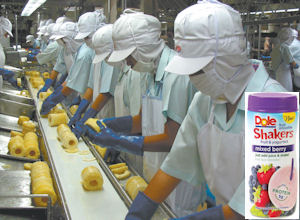Hungry for new business, Dole Food Company is eyeing opportunity in healthy snacks. The Westlake Village company, which generated nearly $7 billion in revenues last year, recently acquired healthy snack maker Mrs. May’s Naturals for an undisclosed amount. The Carson-based company, founded in 2002, produces products such as Freeze-Dried Fruit Chips, Almond Rice Stix and Trio Bars, made with nuts, seeds and fruits. David Spare, vice president of marketing for Dole Packaged Foods, said the company is already at work on new items for the Mrs. May’s brand that will leverage the two businesses’ respective competencies. “The acquisition of Mrs. May’s gives Dole a top quality portfolio of healthy, craveable, nut-based snacks that is complimentary to Dole’s fruit-based snacks, and gives Dole a platform to expand in the natural healthy snacks space,” Spare said. Dole has increasingly taken on the task of launching new healthy food products through consumer research, innovative packaging and new partnerships. In October, Dole introduced Fruit Smoothie Shakers, a container that includes natural fruit and yogurt and allows consumers to have an instant smoothie by adding juice and giving the container a shake. A month later, it entered into a partnership with Healthy Foods LLC, which produces a frozen treat-making device called Yonanas. And as 2011 came to a close, Dole Nutrition Institute introduced New Garden Kit, which provides basic gardening materials for novice gardeners, allowing them to take a crack at growing their own fresh vegetable gardens. When it comes to healthy food, consumers have millions of options to choose from on grocery store shelves. Developing a product that stands out from the crowd is no easy task. Dole, which sells its 200 products in more than 90 countries, is a recognizable brand. But Spare said it takes much more than that to launch a successful product. The company invests millions in research and development each year to launch new products. “The process involves a lot of listening to target consumers,” Spare said. In coming up with new ideas, he said, the company considers several factors including, better packaging forms, nutrition and taste. Dole also invests in extensive market research, which has revealed that much of its target audience includes consumers with a strong desire to eat and live healthy lifestyles. “If we can meet their needs, they’ll tell their friends about it,” Spare said. “They’re healthy eating evangelists.” Harry Balzer, food industry analyst for market research firm, The NPD Group, said three categories continue to dominate consumer interest and attract spending — sandwiches, vegetables and fruit. To remain relevant, companies must continue to chase these categories and constantly ask themselves, “What’s the contemporary version of these categories?” Food companies also must recognize that while consumers may veer towards new experiences in food products and try a new item, they never lose sight of the basics — time and money, he said. Rising commodity costs coupled with cautious consumer spending has made it very difficult for companies to be innovative while protecting their bottom line, Balzer said. And launching a product nationally is expensive from an advertising and marketing standpoint. Last year, Dole spent nearly $100 million on advertising and marketing costs, according to public documents. When developing new product, the company implements a test launch in several markets before launching it nationally, Spare said. In a January research report, Jason English of Goldman Sachs predicted a “challenging market for volume growth” for the packaged food and manufacturing industry in 2012. Companies with a European exposure face higher elasticity as consumer confidence falls and grocery stores in the United Kingdom struggle, English said. “Our U.S. segment volume expectations are also trimmed modestly … though we recognize that improving consumer confidence may fuel upside,” he said. David Spare isn’t worried. As long as the company remains focused on its overall philosophy of putting the consumer first, he said, “everything else will follow. We’ll see results in better sales and profits.”
